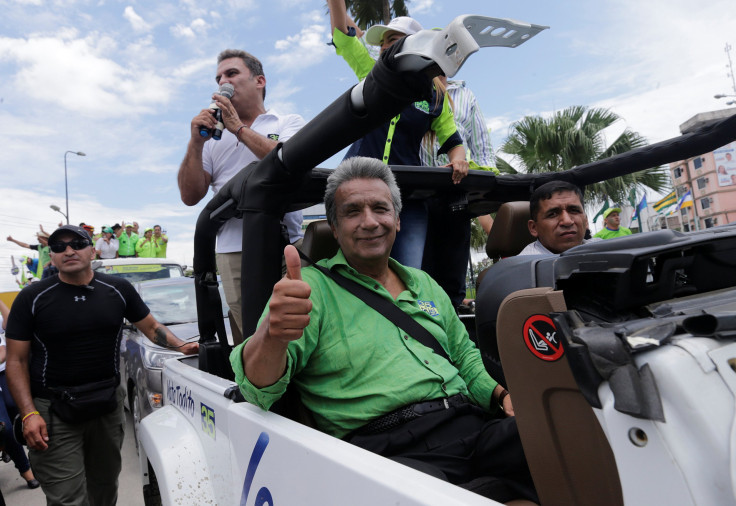Ecuador Election 2017: Candidates, Polls, Issues As Country Votes On First Paraplegic Head Of State

Ecuador will elect a new president for the first time in more than a decade Sunday when Ecuadoreans, as obligated by law, go to the polls to decide who will replace three-term President Rafael Correa. But it is an election that could have wide-ranging consequences beyond Ecuador: from determining whether the shift to the right in South American politics will continue to potentially deciding the fate of WikiLeaks founder Julian Assange.
When he was first elected in 2006, Correa joined an established cadre of leftwing leaders across Latin America, including Hugo Chávez in Venezuela, Luiz Inácio Lula da Silva in Brazil, Evo Morales in Bolivia, Néstor and later Cristina Kirchner in Argentina and Fidel Castro in Cuba. But through elections, death and impeachment, the tide has been rolled back in recent years.
And now Correa, having successfully scrapped term limits but not until after the upcoming election, must stand aside, too. The leading candidate to replace him is his former vice-president, Lenín Moreno, who as his name suggests would continue the leftist policies of his predecessor, although a more moderate version.
If he wins, Moreno would become the first paraplegic head of state having been confined to a wheelchair since being shot in a botched 1998 robbery. Opinion polls have given him a solid lead since his candidacy was announced last October, but the advantage has been slipping in recent weeks.
The 63-year-old, of the ruling Alianza País coalition, has been compromised by a corruption scandal involving his running mate and the current vice-president to Correa, Jorge Glas. Already linked to an investigation into money laundering and bribery at the state-run Petroecuador oil company, earlier this month a video leaked of a lie-detector test taken by a former Petroleum Minister, in which he accused Glas of having knowledge of the corruption.
Latest polls showed Moreno having around a 10-point edge on nearest challenger, Guillermo Lasso of the right-wing Creo-Suma alliance. Like Mauricio Macri, who became president of Argentina in December 2015 to bring an end to 12 years of “Kirchnerism,” Lasso is a businessman who has vowed to lower taxes.
He also said in an interview with The Guardian earlier this month that, if elected, he would ask Assange to leave Ecuador’s London embassy within 30 days. The WikiLeaks founder has been residing in the embassy since seeking asylum in 2012 over fears he would be extradited to the United States.
“There’s no doubt that Ecuador is the next country where the bells of liberty will ring again in Latin America,” Lasso told the Guardian. “People are tired of totalitarian regimes that have turned their governments into dictatorships.”
The stage could well be set for a run-off between the two. To win outright in the first round, a candidate would need to garner a majority of votes cast, or get at least 40 percent and a 10-point lead over their nearest rival. Moreno is currently polling at around 32 percent.
The other candidates are Cynthia Viteri, a former lawyer and congresswoman from the conservative Social Christian Party, and 76-year-old former Quito Mayor Paco Moncayo. However, if there is a run-off between Moreno and Lasso, it is widely believed that the opposition will convene into an anti-Moreno coalition, putting Correa’s legacy in severe jeopardy.
Correa succeeded in lowering the poverty rate in the country from almost 40 percent to less than 23 percent in 2016. However, although not as severely as Venezuela, Ecuador has been hit hard by the declining price of its number one export, oil. The economy shrank by two percent last year, with the International Monetary Fund forecasting a similar downturn in 2017.
© Copyright IBTimes 2024. All rights reserved.




















